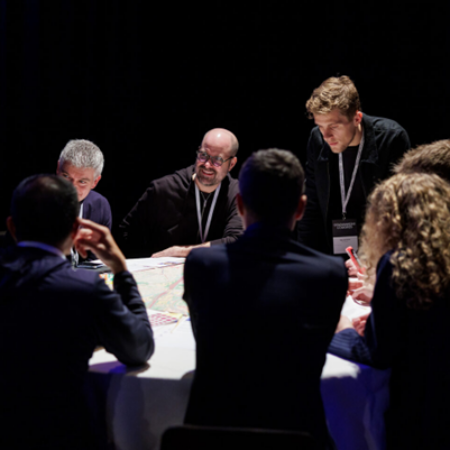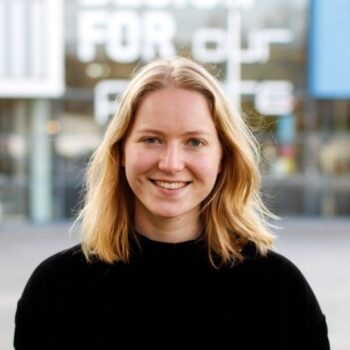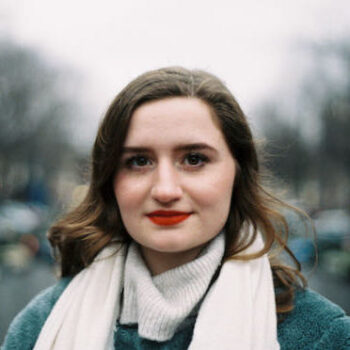Drawing inspiration at the Stadmakerscongres
In November 2023 the Stadmakerscongres (City Makers Congress) took place. The symposium at Theater Rotterdam connects specific urban and social development themes and challenges with practical initiatives, neighbourhoods and areas within the city. Everyone who cares about Rotterdam's development could contribute with their own expertise, curiosity and ambition. The PCM Lab took this opportunity to participate in the program and be inspired. Ingrid Mulder, Sterre de Jager and Betsie Loeffen share some of their insights!
Systems change for public-civil cooperation
In the morning, we participated in the session ‘infrastructuur van invloed’ (Infrastructure of influence), exploring new structures of cooperation from the perspectives of residents, skaters, nightlife and neighbourhood councils, among others. Led by Robbert de Vrieze, social designer and architect, 10 different groups, networks and initiatives shared how they influence the development of the city. What strategies and tactics do they use to enable new forms of city-making together? How can they increase their influence by working together in a community of communities? And how do institutional organisations become receptive to that influence and join the transition to a symbiotic ecosystem of the community economy? In small groups we entered fruitful discussion, sharing our ideas on these questions.


(Photos by Aad Hoogendoorn)
More and more organisations are convinced of the power of communities when tackling societal challenges. However, as Betsie noticed during the discussions, there is a risk at play when exploiting this power. How to ensure that authentic initiatives do not become prey to policy, politics, institutions and funds? How do you prevent authentic initiatives from also institutionalising and turning social connections into economic ones? It shows the importance of protecting the social connections from political and economic values becoming dominant.
There was another notable topic of discussion observed by Sterre and Ingrid during the session, as initiatives risk encountering obstacles such as funding constraints, political tensions, and bureaucratic hurdles. Within this context, it often remains unclear for these initiatives how to successfully position themselves as valuable brands. Articulating the distinct value of self-formed consortia, while on specific topics deemed crucial on the political agenda, is still a task that should not be underestimated. Given the difficulty of reaching and collaborating with political figures, this becomes increasingly crucial, presenting numerous challenges ahead.
Infrastructure of collaboration
In the afternoon, Sterre and Betsie joined the audience of the panel discussion ‘infrastructuur van samenwerken’ (infrastructure of collaboration). Assistant Professor in Urban Politics and Planning Nanke Verloo presents insights from her long-term research on citizen participation. She explains that even when all kinds of tools and methods are used, things often end up going wrong due to ‘random’ coincidences. Verloo shares 10 critical moments for improved participation processes: moments when the relationship is receptive to change. Her talk concluded with what she believes is most needed now in terms of participation: interpretive listening, role stability, space to improvise, appreciation of diverse knowledge and a search for interdependence.
An inspiring talk! Which, however, also prompts reflection on whether improving participation with such guiding principles truly moves us towards new forms of collaboration, or whether it brings participants back to institutional dominance. And how to make sure that there is careful thought about why you want to start a participation process in the first place, seen from all perspectives?

(Photo by Aad Hoogendoorn)
The second talk discussed how societal values can be embedded in urban development, looking at how responsibility should be delegated while maintaining progress. It struck Sterre that this involved immediate reflection and action regarding the nominees of the Van der Leeuw Prize 2023, awarded in the morning. One of the nominees was the ALL DAE community, founded by Christine da Silva and Fabiënne Arraz Soares. ALL DAE provides a safe environment for young adults, responding to young people’s needs where agencies are not sufficiently aware of those needs. The ALL DAE community finally had a physical space, which they lost again after a short time due to plans for building new houses. Besides conducting the ‘regular’ panel, the participants of the discussion immediately joined hands to help this initiative get a new building again, without ALL DAE having to ask for it themselves. Very inspiring!
In conclusion, the Stadmakerscongres was an inspiring day, fuelling our motivation to continue contributing to the ongoing urban and social development of Rotterdam from a design (research) perspective.

